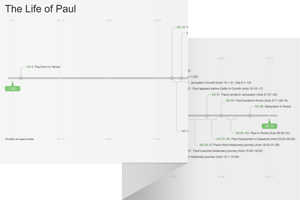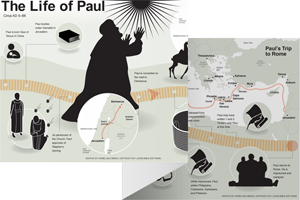1:1–2 Among the shorter letters written by Paul, 2 Thessalonians opens with a greeting typical of Graeco-Roman letters. As he does in 1 Thessalonians, Paul includes Silas and Timothy as cosenders of the letter (see note on 1 Thess 1:1–10). |
 Introduction to 2 Thessalonians
Introduction to 2 Thessalonians
 Paul: A Life of Redemption and Transformation
Paul: A Life of Redemption and Transformation
 Pauline Self-Designations Table
Pauline Self-Designations Table
Silvanus See note on 1 Thess 1:1.
Timothy His report to Paul prompted the first letter to the Thessalonians (1 Thess 3:6–7).
church of the Thessalonians See note on 1 Thess 1:1.
1:2 Grace to you and peace See note on 1 Thess 1:1.
1:3–12 Paul offers a prayer of thanksgiving on behalf of the Thessalonian believers. He begins by praising their faith in God and love for one another (2 Thess 1:3). He then commends their endurance in the face of persecution, which he claims serves as proof of God’s righteous judgment (vv. 4–5). Paul then offers a warning of the harsh punishment awaiting those who oppose God’s people (vv. 6–10). The section ends with an intercessory prayer for the Thessalonians’ faith (vv. 11–12). |
1:3 We ought to give thanks to God See note on 1 Thess 1:2.
your faith is flourishing The Thessalonian believers’ trust in God continued to grow despite persecution by nonbelievers. For this reason, Paul gives thanks to God.
toward one another is increasing An answer to Paul’s prayer (see 1 Thess 3:12).
1:4 boast Paul boasts about the Thessalonians because of the flourishing of their faith and love. For this reason, they serve as a model for other churches.
your persecutions and the afflictions Paul encourages the Thessalonians by reminding them that their situation is only temporary. Christ will return and reward them for their faithfulness while judging those who persecute them. See note on 1 Thess 2:14.
1:5 righteous judgment of God Refers to a legal decision made by God, not condemnation from God. The persecution endured by the Thessalonians is not the result of God’s condemnation; rather, their endurance will result in God’s counting them worthy of His kingdom. Paul describes God’s decision as righteous because it is right and just.
kingdom of God The domain God rules as King. The believers suffer persecution because they have declared allegiance to Jesus, a king other than Caesar (see note on 1 Thess 2:12; compare Acts 17:6–7). Paul encourages them that their response to this persecution—increased faith in God and love for others (1 Thess 1:3)—is proof that they are worthy of God’s kingdom.
God rules as King. The believers suffer persecution because they have declared allegiance to Jesus, a king other than Caesar (see note on 1 Thess 2:12; compare Acts 17:6–7). Paul encourages them that their response to this persecution—increased faith in God and love for others (1 Thess 1:3)—is proof that they are worthy of God’s kingdom.
 The Kingdom of God: Already but Not Yet
The Kingdom of God: Already but Not Yet
1:6 afflicting you with affliction The Thessalonian believers were probably tempted to retaliate against their persecutors. Believers need not avenge themselves because God—the righteous judge (Deut 32:35)—will avenge them at His second coming (see Rom 12:19; note on 1 Thess 5:15).
1:7 revelation of the Lord Jesus Refers to the second coming of Jesus Christ.
angels Supernatural beings in service to God who deliver messages on His behalf and provide help to His people (Heb 1:13–14).
in service to God who deliver messages on His behalf and provide help to His people (Heb 1:13–14).
 Angels in the Bible Table
Angels in the Bible Table
1:8 burning flame Symbolizes God’s visitation (Exod 3:2; 19:18) and judgment (Isa 66:15–16; Jer 15:14).
 Theophany in the Old Testament
Theophany in the Old Testament
 Fire as a Motif of Divine Presence
Fire as a Motif of Divine Presence
those who do not know God Knowing God is not just mental assent to facts about God, but personal loyalty to Jesus as Lord and God (see Matt 7:21–22; Luke 6:46).
do not obey Refusal to do what God commands. Disobedience is an indication of distrust in God.
gospel The good news of Jesus Christ whose life, death, and resurrection make relationship with God possible. Those who oppose the gospel (in Greek, euangelion) will face God’s wrath (see 1 Thess 2:14–16). Paul gives a brief definition of the gospel in 2 Tim 2:8.
in 2 Tim 2:8.
 Euangelion Word Study
Euangelion Word Study
our Lord Jesus The title “Lord” (Greek, kyrios) threatened Caesar’s claim to lordship (see John 19:15).
1:9 eternal destruction Those who reject Jesus Christ will be separated from God’s presence and glory. This punishment will be everlasting (compare 2 Thess 2:16). Paul’s language recalls similar descriptions of God’s final judgment in the nt (e.g., Matt 25:46; Jude 7).
1:10 to be glorified on that day Yet another reason for the second coming of Christ.
on that day Refers to the Day of the Lord (or the day of Yahweh; see 1 Thess 5:2 and note). In the ot, it is the day in which Yahweh grants His people salvation and punishes His enemies with everlasting destruction (e.g., Isa 11:10–11; Joel 2:1–12, 31–32)..

|
About Faithlife Study BibleFaithlife Study Bible (FSB) is your guide to the ancient world of the Old and New Testaments, with study notes and articles that draw from a wide range of academic research. FSB helps you learn how to think about interpretation methods and issues so that you can gain a deeper understanding of the text. |
| Copyright |
Copyright 2012 Logos Bible Software. |
| Support Info | fsb |
 Loading…
Loading…




